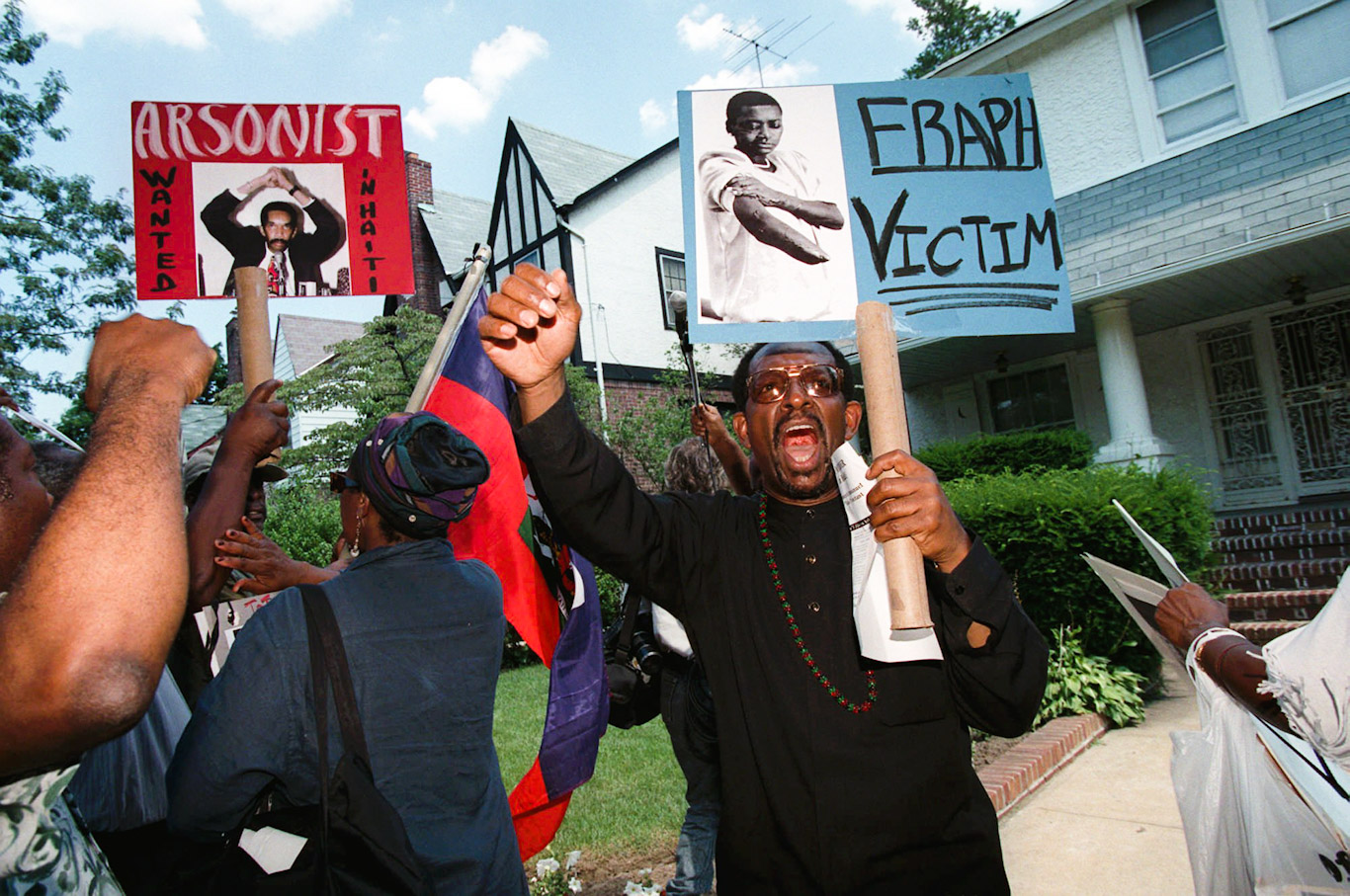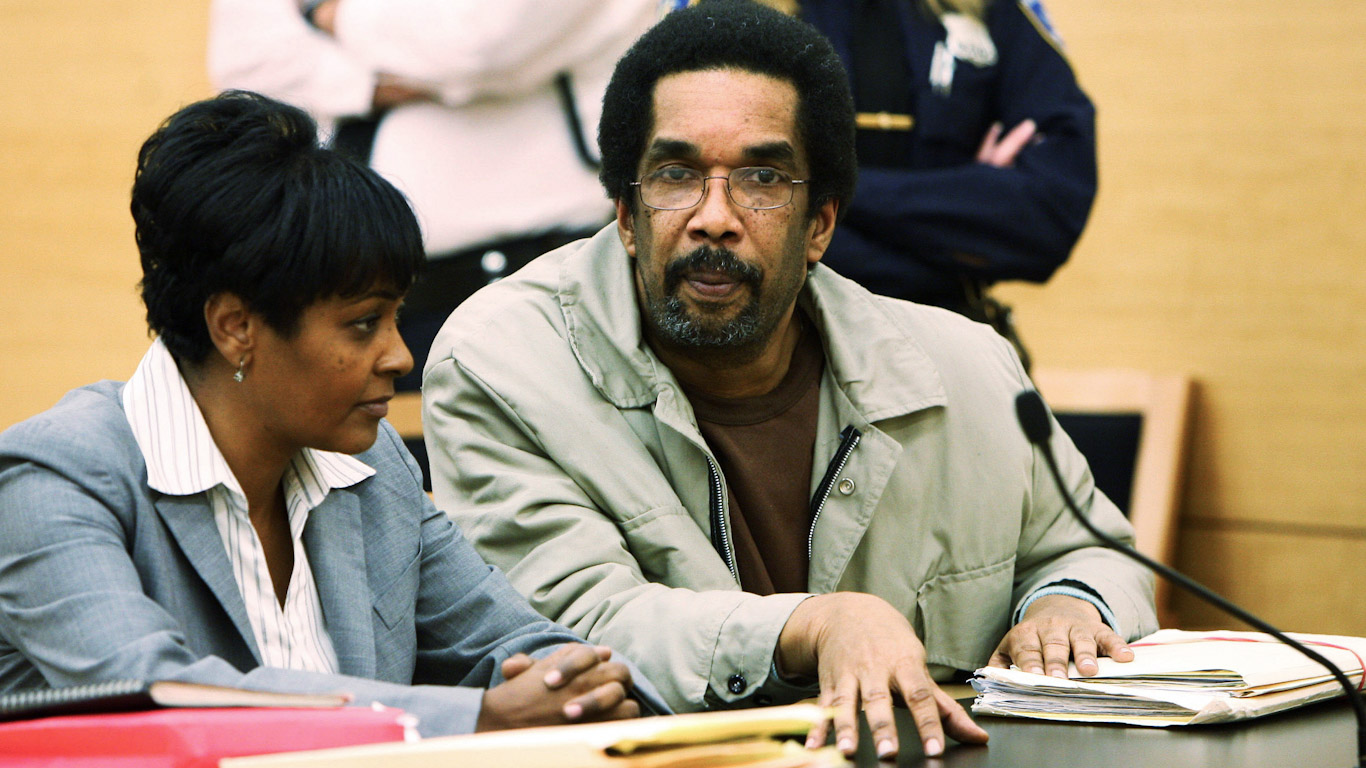Emmanuel “Toto” Constant exercised his insurance clause as soon as he was apprehended in the Spring of 1995 in New York by the extant Immigration and Naturalisation Service (INS), now a part of the Department of Homeland Security. The infamous leader of Haiti’s Front for the Advancement and Progress of Haiti (FRAPH) had to flee his home country after his CIA-backed militia massacred supporters of President Jean-Bertrand Aristide in the Raboteau massacre.
Today, Constant was supposed to board an ICE deportation flight along with 100 other Haitian nationals in what is the third such flight the Trump administration has carried out to Haiti in the last several weeks. The Haitian government has called for a moratorium on deportations in the midst of the COVID-19 pandemic after three passengers on an earlier flight tested positive for the virus.
The fact that Emmanuel Constant, who is currently serving time in a New York State prison for a 2008 conviction of mortgage fraud and grand larceny, was scheduled to be on Monday’s flight caused unfavorable reactions in some quarters. The Miami Herald carried a quote from Michigan Democrat, Andy Levin, denouncing the deportation: “The idea that the U.S. would deport Toto Constant back to Haiti under these circumstances is terrifying”, asserted Levin adding that Constant’s status as a war criminal in Haiti coupled with that nation’s corrupt court system represented “a huge problem in itself.”
Toto cashes his insurance policy
What’s clear from the notorious death squad leader’s history with the U.S. and its own court system is that many influential people in several of our alphabet agencies do not want Constant on trial in any courtroom.
The first time Constant’s ties to U.S. intelligence became a problem was the result of a lawsuit brought by New York-based Center for Constitutional Rights (CCR) in the mid-nineties on behalf of a gang rape victim by Constant’s FRAPH forces. When CCR’s counsel subpoenaed documents relating to the FRAPH in possession of the CIA and DIA – both of which Constant had implicated after his first arrest – the intel agencies admitted to being in possession of a single document, but reserved their right to withhold it from the proceedings on the grounds that it was “privileged.”

Eventually, the Department of Defense would cop to having possession of 60,000 pages regarding the creation of FRAPH, which nevertheless remain hidden in their vaults. Constant’s early revelations, such as his direct contact with Defense Intelligence Agency (DIA) handlers and claims of U.S. encouragement to form the anti-Aristide mercenary brigade, bought him an early reprieve from his first close call with deportation.
ICE melts in Fire
Constant is being held at the ICE federal detention facility in Buffalo, NY, where he has been awaiting deportation after being released early from a 37-year sentence related to his fraud convictions in 2008. Some, including the National Network for Human Rights (RNDDH) and 15 Democratic Senators have raised concerns over the ongoing deportation flights. Rosy Auguste, from RNDDH, underlined the danger faced by the “large number” ICE deportees “who have never faced a judge and have been held indefinitely while facing only minor charges” going back to a country undergoing a “crisis of impunity”.
Beyond the controversy surrounding ICE’s very existence and its methods, the situation on the ground in Haiti at present is deteriorating quickly as the country’s fragile economic reality meets the global coronavirus shutdowns and the sinister free-market incentives that keep scarce healthcare supplies from reaching Haiti. While COVID-19 has pushed their hospitals to capacity and thousands try their luck across the border in the Dominican Republic, Haitian Prime Minister Joseph Jouthe revealed during a radio interview last Tuesday that supplies are being held up by air cargo companies serving the highest bidders.
Jouthe also exposed U.S. duplicity when he disclosed that American officials had assured him detainees on the ICE deportation flights had all been tested prior to boarding. Had the Haitian government accepted the information at face value, Haiti would have a much more serious outbreak on its hands.
As Haiti demands that ICE deportation flights be halted, the attempted deportation of Constant at this particular moment raises many questions. DHS tried to deport him once before in 2008 when it tried to keep Constant out of the courtroom and requested the federal judge on his case sentence the Haitian fugitive to time served. But, the judge balked and ordered the son of a Duvalier commander to stand trial for mortgage fraud.
Opaque intentions
Toto Constant modeled the FRAPH on the “Tonton Macoutes” paramilitary units that terrorized Haiti during the Francois Duvalier dictatorship. He asserts that the idea came directly from a DIA attache, and Constant’s first handler, Col. Patrick Collins, to do “intelligence” work in Haiti against pro-Aristide groups.
Constant’s relationship to the U.S. intelligence community was known in Haiti from the very beginning and was convicted by Haitian courts in absentia after the U.S. refused to extradite him when Haiti issued a warrant for his arrest.
Given that elements within Haiti’s present-day government still have ties to the same interests that backed Constant’s FRAPH and have managed to release other FRAPH mercenaries convicted for their roles in the massacre, as well as the persistent and deleterious presence of U.S. deep state entities in the country, the real motive behind Constant’s deportation remains elusive.
Feature photo | Emmanuel Constant, right, sits with his attorney Marie Pereira during a hearing at State Supreme Court in Brooklyn, N.Y. Jesse Ward | AP
Raul Diego is a MintPress News Staff Writer, independent photojournalist, researcher, writer and documentary filmmaker.


